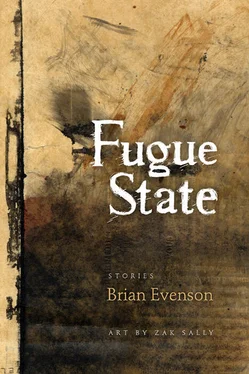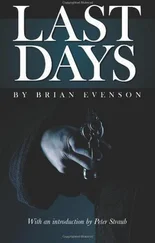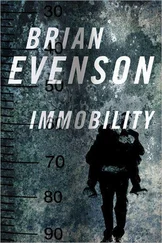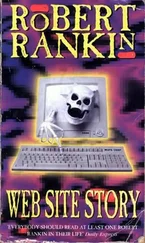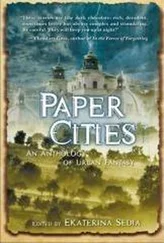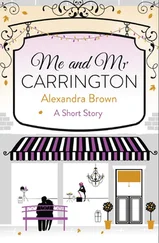He came in, he sat. His hat and coat I hung from a hook beside my door. His gloves he paired and smoothed and laid gently over his knee once he had sat. His name was Halber, he claimed.
“And who was it sent you?” I asked, though I knew the answer.
Your leader, he claimed. Who had said that I would adjudicate for him.
“Adjudicate?” I said.
Yes, he claimed, since that was my role in the community or so he had been told by Rasmus.
I nodded for him to go on.
The story he unraveled was one of the utmost wrongheadedness. He had once, it seemed, so he claimed, owned all of this property, but when the conflagration had come he had traveled quickly and hurriedly to try to throw his body in the path of his parents’ death. He had of course mis-thrown himself; they had died despite him, his mother going mad so that in the end he had had to be the one to kill her, and his father simply having his skin slough off until the bone was showing. Upon which he thought to return, but the world being as it was, he had spent many months just keeping alive, and only now had he begun to manage.
What he wanted, he stated, was not to reclaim his land. He understood well enough the degree to which everything had transformed. All he wanted was to be given a small plot of land and be allowed to farm it, so he could be back in a place that he knew, and to be accepted into the community. He had said this to Rasmus and the council, and they had deliberated for three days as he awaited their decision. At last they had sent him to me, the adjudicator.
Adjudicator, I thought. Well, that’s one name for it.
I thought, too, with sudden insight, Normally they would kill him themselves, and perhaps have done so with others in times past. But because, like me, he is hairless, they have sent him to me. They are frightened.
And this made me think, too, of what they must have thought of me, and why they had chosen to admit me into the community. And I could not but think it was out of fear or because I was already there, and perhaps it was only because there were those among them who believed I was charmed or cursed and could not die. And perhaps soon, once I had done away with Halber and proved that a man like myself could be killed, they would see no reason not to do away with me as well.
“Please tell them,” I said, “that I have thought carefully and have adjudicated in your favor. You shall join us.”
He stood and awkwardly embraced me, an operation I suffered only with great reluctance. And then after gathering his things he left, leaving me to ponder why I had done what I had done, and what would be its dark consequence.
I was not to wonder long. Late that night I heard shouts and, as I roused myself, a banging had begun at my door. “It’s Halber!” a man was screaming, his screams enough to curdle the blood. “It’s Halb! Let me in!”
And indeed I almost did. I might well have, had I not heard the other voices and sounds that followed, the grunts and indifferent, dull sounds of metal slipping into flesh, and heard the pounding suddenly stop. I climbed onto the bed and looked down through the high window. In the pale moonlight I saw him, dying and staring, being dragged away by the legs. Had it been only a pack of the dead and the dying, I would have perhaps opened the door and commenced to lay about me with my hatchet, as I had done in the past when the dead came for the living. But as it was, seeing that the faces were those of the living, Rasmus’s face among them, I hesitated just long enough to feel that it was too late.
And perhaps it is there that the story should have ended. Perhaps, had I said nothing, done nothing, kept to my house, then my reputation, the myths surrounding me, would have been enough for Rasmus and his council to decide to let me be. Perhaps they would have grudgingly levied a fine, remembered my usefulness in other ways, and life would have gone much as usual, if anything can be described as usual in these days. But we both of us made mistakes that made this impossible.
The mistake I made was in not staying to my house for a few days, deciding instead to tend to my crops, to go about the business that needed to be attended to on my farm. This, under most circumstances, would not be considered a dire mistake. Or, to be frank, in most conditions, even a mistake at all.
Their mistakes were more severe. Tired of dragging the body, they abandoned it in a ditch halfway between my and my neighbor’s farms. And instead of tearing the head free of the corpse and incinerating it, they left the hairless Halber lacerated but more or less intact.
With every disaster, I have come to believe for my own personal reasons, comes a compensation, a certain balancing of the accounts — not spread evenly about but clumped here and there, of benefit to very few. I heal, as I said, very quickly — or at least I do now; before the conflagration I did not. There are rumors I cannot die. Not having died, I can neither confirm nor deny these rumors, nor am I curious enough to uncover the truth that I feel compelled to slit my own throat. But from what I have seen of what is happening to Halber, I fear these rumors might well be true, and hardly in the way one would hope.
So, we have reached the day after Halber was hauled away, my door clawed and scratched on the outside, the bloody marks of his dying smeared there and on the threshold. I stare at the door a moment, checking to see whether my hatchet is with me. Outside, there are always things to attend to, things to do to keep the farm going. I do them, wondering all the while when, if ever, the little poultry and livestock remaining in the area will start to breed again and if I will ever be able to afford my own chickens. I irrigate my fields again, just enough, then sit on a stone near the border of the field, and smoke.
That is when I begin to hear it, a slow and distant whistle, a soft wind. At first I think nothing of it. But when it persists, I become afflicted with the disease of curiosity.
I stand, trying to ascertain where it is coming from. I follow it in one direction, then another. It slowly becomes louder, just a little louder, just a little louder, a moan now.
It is some time still before I make my way out to the road and follow it a little distance down and find him there, Halber, bloody in the ditch, grievously wounded — by all rights he should be dead.
What do I do? One look is enough to tell me he should be dead. I have dealt often enough with the living turned dead to be leery, but he struck me as something different, as a new thing.
He was in any case too hurt to be moved. I went back to the house, brought back a blanket and some water. I wrapped him in the former and dribbled the latter into his mouth. He was delirious and hardly conscious. He would, it seemed to me, soon be dead.
And so I stayed there beside him, waiting for him to die.
Only he did not die. His body seemed unable to let go but also unable to heal itself, and so he struggled there between life and death. I thought for a moment to kill him, but what if he did heal himself? I wondered. Was he not like me? Would he not eventually heal himself?
In the end I left him and went home to sleep.
That night I dreamt of him, lying there in his ditch, slowly dying but never dead, breathing in his shallow way but breathing despite everything, never stopping. And then, his breathing no less shallow, he managed over the course of long, painful moments to make it to his feet and shuffle forward, like the walking dead. I watched him coming. Later, much later in my head, I heard a knocking and a dim, inarticulate cry and knew him — suddenly and with, for once, a certain measure of terror — to be knocking on my door.
When I came back the next morning, I found my blanket was gone, stolen. Some creature had eaten most of one of his hands and the finer portion of his face. But he was still, somehow, alive. And so I slit his throat and watched the blood gurgle out, and then went back to get on with my work.
Читать дальше
